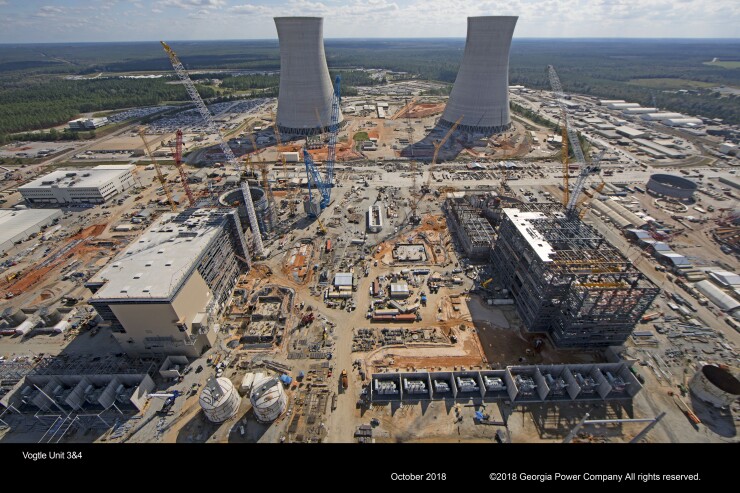A Florida municipal utility’s attempt to get federal regulators to evaluate a nuclear power purchase agreement contributes to uncertainty facing utility investors, according to Fiera Capital.
JEA, formerly Jacksonville Electric Authority, has requested that the Federal Energy Regulatory Commission take jurisdiction over its 20-year power purchase agreement with the Municipal Electric Authority of Georgia.

Municipal utilities, wholesale agencies and electric cooperatives across the country have asked to intervene in JEA’s case, Miriam Legrand, Fiera vice president of corporate credit, and Reese Trucks, vice president of credit research, said in a Nov. 5 joint commentary.
“This is a noteworthy development because public power agencies and cooperatives are supposed to be exempt from FERC oversight,” they said. "If federal regulators take jurisdiction in JEA’s case, the public power agencies believe it could open the door for FERC to oversee the wholesale power contracts of other public utilities."
The case before FERC is one issue creating volatility, Legrand and Trucks said, adding that delays in constructing two nuclear reactors in Georgia, higher costs, and legal challenges are also to blame.
JEA's take-or-pay power purchase agreement with MEAG is related to the reactors under construction at Plant Vogtle. MEAG holds a 22.7% ownership interest in the project. The PPA requires that JEA buy 206 megawatts of nuclear-generated power from MEAG.
MEAG has issued about $1.42 billion of Project J bonds to finance part of its interest in the project. JEA is obligated to pay debt service on the bonds for the first 20 years under the PPA.
JEA in a Sept. 18 petition said it wants FERC to determine if its power purchase agreement is “just and reasonable” because the cost of the twin reactors has doubled and the work has been delayed.
The two reactors were initially expected to cost $14 billion and commercial operations were to start in 2016 and 2017.
By 2017, Fiera said the project was five years behind schedule and the primary contractor, Westinghouse Electric Co. had filed for bankruptcy, defaulting on its contracts to build reactors in Georgia and a similar project in South Carolina that has since been abandoned.
Georgia Power Co., the investor-owned utility with a 45.7% ownership stake in the Vogtle units, and public utility owners including MEAG subsequently hired Bechtel Power Corp. as the new contractor.
In August, Georgia Power announced that costs had surged by $2.3 billion, and that the reactors were expected to begin operating in 2021 and 2022.
In September, MEAG, Oglethorpe Power, which owns 30% of the Vogtle project and the city of Dalton, with a 1.6% ownership interest, voted to proceed with the project after inking a deal with Georgia Power and its parent company, Southern Co., to assume a greater pro rata share of future cost increases.
“Given the number of years before Vogtle 3 and 4 nuclear units are expected to be completed, this will create a period of volatility and uncertainty across the public and investor-owned utility market,” Legrand and Trucks said. “We will continue to monitor execution as this key piece of U.S. infrastructure proceeds along.”
In addition to the FERC case, JEA and the city of Jacksonville sued MEAG Sept. 11 in a Florida state court asking a judge to void the PPA because it “purports to saddle JEA and its ratepayers with an unlimited obligation to fund the exorbitant and ever-ballooning cost of constructing units of a nuclear power plant that JEA does not own.”
The complaint also claimed that the PPA should be vacated because it was never approved by the Jacksonville City Council as required by Florida’s constitution, and that it violates the city charter as well as Florida’s public policy.
The issues in the state court case, which has been closed, will now be considered in a federal lawsuit filed by MEAG.
MEAG’s case contends that JEA breached its contract to buy electricity that will be generated by the reactors because JEA has demanded that the project be cancelled several times, including in correspondence with the U.S. Department of Energy. The Energy Department has provided loan guarantees to MEAG.





